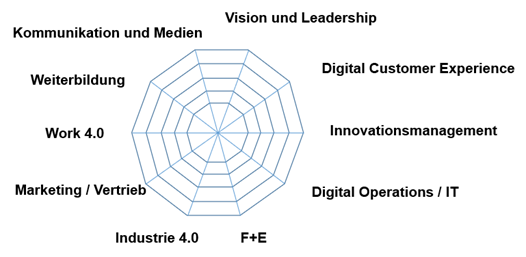Ready for the digital future? How companies can equip themselves for the digital transformation
Celine Jörns
Our former working student, Celine Jörns, took part in Prof. Eichsteller's strategy course as part of her Masters in Media and Communications Management at the Hochschule der Medien. In the Strategy Challenge 2023, she and her dedicated fellow students collected impulses from young professionals on the success factors of the future. The conversations provided fascinating insights into the future of digitization, the chemical and healthcare industries, and the innovation landscape.

Not a single retail store of its own, yet the largest global bookseller. Not a single hotel of its own, yet the hotel chain with the best ratings. Not a single vehicle of its own, yet a mobility provider worth billions. If you immediately think of Amazon, AirBnB and Uber, you're right on the money. But what do these three companies have in common besides outstanding global business success? They have all harnessed the possibilities of digital solutions, developed new disruptive business models, and thus displaced established players in their industries. At this point at the latest, it becomes clear what impact digitization is having on the economy and how urgent it is to adapt strategy work and digitally transform established companies.
What does Digital Transformation mean?
If you search the media for a generally valid definition of digital transformation, you will search in vain. It is also noticeable that the terms digitization and digital transformation are often used synonymously, even though they do not mean the same thing. Initially, digitization describes the pure conversion of analog information into digital data, but in a broader sense it also describes the supplementation or even replacement of analog processes by technologies. Digital transformation presupposes digitization, but goes beyond it. As a holistic process, it continuously calls existing business processes into question and describes changes that are deliberately brought about on the basis of digital applications. These serve to tap new value creation potential and can even bring about new business models.
Digital Transformation - NOW!
Its four characteristics illustrate how urgent digital transformation is for companies: It is inevitable because companies can no longer meet today's societal challenges without digital solutions, be it demographic change or sudden pandemics. Users are also used to living with digital solutions and no longer want to do without them, making the transformation irreversible. What is trendy today may already be obsolete tomorrow - the tremendous speed of digital transformation requires immediate action. This is also accompanied by uncertainty, because the pace of new developments and technologies ensures that it is impossible to predict who will be successful with which solutions. It is becoming clear that Digital Transformation is not just a fad and is no longer optional for companies. Instead, new innovation methods must be developed, employees must be equipped with digital skills, and even solid business models and processes must be questioned.
Is your company ready for digital transformation?
To check whether their own company is properly positioned for a digital transformation, managers should conduct an analysis of the current state. For this purpose, the Digital Readiness Index is presented below (see Eichsteller & Lorenz, 2019 based on diconium strategy). The model consists of ten dimensions that are assessed in terms of their digital readiness. Thereby, the spider web-like tool can be scaled individually via percentages or scoring models. The aim is to visualize the actual and target state within the model by entering the scores in the spider web.

Vision & Leadership: Does management have a clear vision of how digitization will impact the company, its positioning and value creation?
Digital Customer Experience: Does the company offer a digital customer experience and respond quickly to changing customer needs?
Innovation Management: Is the company's innovation management well positioned?
Digital Operations / IT: Is the IT equipment and IT budget above average compared to the competition?
Research & Development: Is the latest best systems and capacities available to R&D?
Industry 4.0: Are there competencies for Industry 4.0, potentials for IoT and interfaces for a digital supply chain?
Marketing / Sales: Are digital approaches used in marketing / sales (real-time data analysis, dynamic pricing, personalization, etc.)?
Work 4.0: How flexible is the management, working time, work locations and framework for employees in the company?
Continuing Education: Are there measures in place to train management and employees in digital skills?
Communication and media: Is the need for digital transformation communicated within the company?
Strategic collaboration with startups on the path to digital transformation
Startups are considered to be particularly innovative and ready for the digital world. Collaboration and cooperation with young companies therefore represents a promising opportunity for established companies to drive their digital strategy forward. The two partners can benefit from each other in the process. While startups can test new ideas on the market more easily, have more digital know-how and are experienced with the use of new technologies, established companies provide access to their broad network and offer capital for expansion. From customer-supplier relationships, project collaborations, co-creation, joint ventures, incubators, accelerators to acquisitions, there are numerous collaboration opportunities for management to consider. However, a survey of 604 companies commissioned by the digital association Bitkom shows that only one in four companies cooperates with startups and thus misses opportunities in the course of digital transformation. "Hardly any company will be able to manage without a digital business model in the future. For SMEs in particular, cooperation with startups is often the best way to gain access to new technologies and digital innovations," says Bitkom President Achim Berg.
The German Federal Ministry for Economic Affairs and Climate Protection also supports cooperation between companies and startups with the Digital Hub Initiative. Here, companies can turn to twelve different Digital Hubs with different industry focuses and are brought together with startups to exchange ideas and develop digital solutions. One of these competence locations is Mannheim / Ludwigshafen with the 5-HT Digital Hub Chemistry & Health. The two managing directors of the hub tell us how the digital transformation is progressing in the chemical industry and what to consider when cooperating with startups for chemical companies.
Expert interview with Dr. Frank Funke & Stefan Kohl
Dr. Frank Funke and Stefan Kohl are the two managing directors of the 5-HT Digital Hub Chemistry & Health. As a central facilitator, this offers established companies, startups, investors and other players the opportunity to network, cooperate and co-develop in order to promote digital solutions and accelerate digitalization. The focus is on the digital chemical and healthcare industry.
 Stefan Kohl & Dr. Frank Funke
Stefan Kohl & Dr. Frank Funke1) What are the current challenges in the chemical industry in connection with the digital transformation?
The chemical industry in particular is currently facing a general reassessment of its future strategy and orientation. As a result of the Corona crisis and, even more so, the Ukraine crisis and the European Green Deal, new strategies must be developed that also have an impact on digital transformation. Currently, many products (e.g., fertilizers) whose raw material is gas can hardly be manufactured economically in Europe. Many plants have been shut down, while other plants are only operating to a limited extent. The European Green Deal will increase additional requirements for the production of very many chemicals. In the future, these are more likely to be produced in other parts of the world and then exported to Europe. Accordingly, digital traceability and control of supply chains will continue to increase. In the logistics sector, there will therefore be a further increase in digitization. The digitization of production facilities in Germany will tend to slow down because it is not yet conclusively clear whether productions will not be relocated completely outside Europe.
2) In your experience, how is the management of chemical industrial companies reacting to the digital transformation?
There is no clear trend here. Digital transformation is always driven forward by management where short-term cost savings can actually be realized or where regulatory requirements make this necessary, e.g., in the collection of data. In many cases, however, we have the impression that digital transformation is only talked about by top management because this is part of good manners, while even the simplest activities in chemical companies, such as recording and transferring measurement results, are still done manually.
3) How does the chemical industry compare to other industries in terms of digital transformation?
If various surveys are to be believed, the chemical industry is slightly above average compared to other industries in terms of digitalization. This is certainly due to the fact that control stations in chemical plants were already digitized decades ago, when the term digitization was not even in use.
4) What do established chemical companies or SMEs need to bear in mind when cooperating with startups?
Basically, time and money should be made available for innovation projects. Often, the specialist departments are already working to capacity, and neither personnel nor budget are available for the evaluation and possible implementation of startup solutions. However, it is not enough to simply hire an innovation manager and say we deal with startups. Companies also need the appropriate framework and processes to actually interact with startups. First of all, it must be defined as clearly as possible for which problems the corporate is looking for a solution. This definition of the search field should be developed with consideration of the department or, even better, by the department itself. If it is clear which challenges exist in the individual areas, the innovation department can search for startup solutions in a much more targeted manner.
5) In your experience, what is the attitude of the management of chemical companies toward collaboration with startups as part of their digital strategy?
Management is rather reluctant to collaborate with startups. While it is understood that startup solutions certainly drive innovation in their own companies, experience in larger companies has often shown that startups cannot handle the complexity. In some cases, this leads to a certain reluctance. The BMWK's digital strategy does not play a role here, as it is currently only known in specialist circles, but is hardly understood here either.
8) In conclusion, what recommendations for action can you give for dealing with the digital transformation in the chemical industry?
In principle, digital transformation in the chemical industry must be considered on a case-by-case basis. Manufacturing companies are to be viewed differently than companies that are active in chemical trade or distribution, for example. Much often depends on the company philosophy and the attitude of the management and employees for this topic. Basically, however, it can be said that from our point of view it is crucial to define clearly defined projects, the size of which really makes realization possible and appears certain. Based on these successes, you can then plan further steps within the framework of your digital agenda and convince the necessary comrades-in-arms of this path and take them along with you.
KEY TAKEAWAYS
- Continuously question your business models & processes.
- Review your company's digital readiness and set priorities for your digital strategy
- Look for digital startup solutions to drive your digital strategy forward
- Clearly define the problems for which you need solutions - ideally directly in the business department
- Plan sufficient resources for digital projects
- Communicate the need for digital transformation within the company and convince your employees.
5-HT Chemistry & Health Newsletter
Want the latest tech and industry news, events, relevant info from the ecosystem and more?
Subscribe to 5-HT Newsletter now Subscribe to 5-HT Newsletter now
Become part of the 5-HT Chemistry & Health
Exchange ideas with innovative startups and future-oriented companies in our ecosystem. We look forward to meeting you!